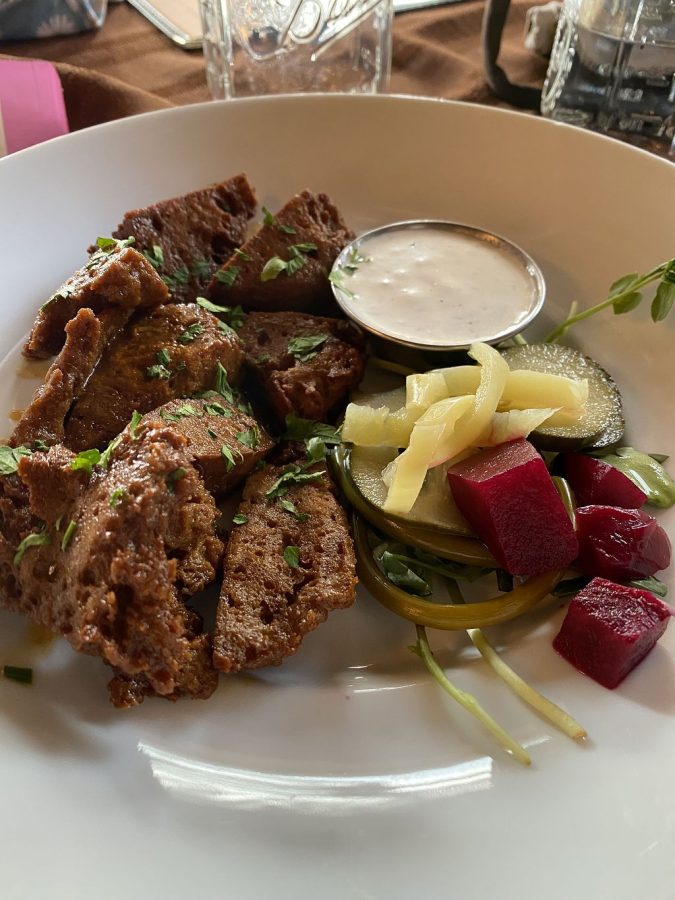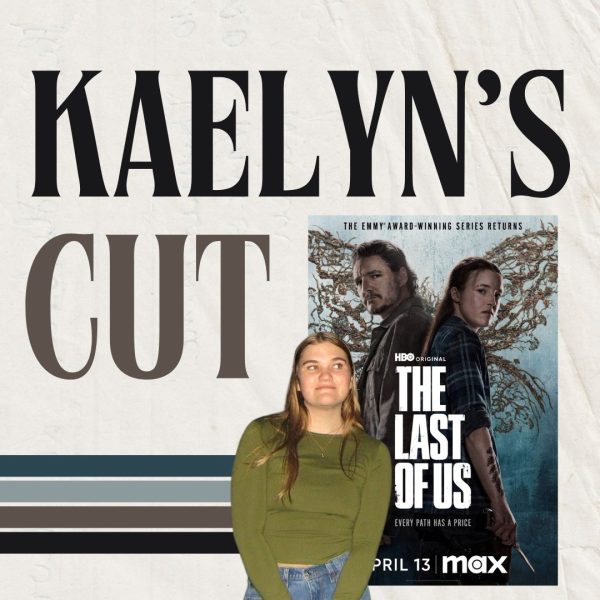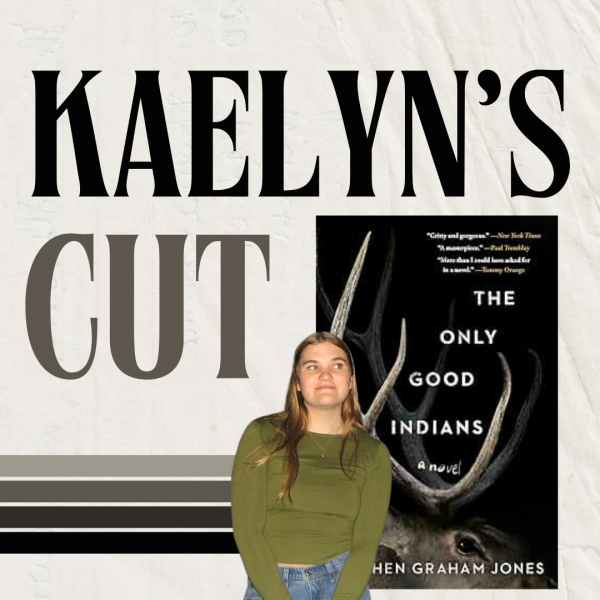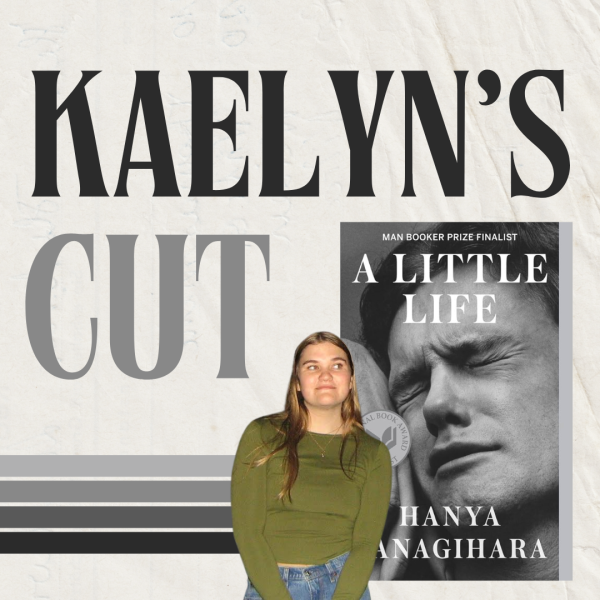My Vegetarian Lifestyle
The tradition of vegetarianism has been around since ancient times and many people are still vegetarians today. I am one of those people.
The Barbecue seitan wings served at the vegan restaurant Trumpet Blossom Cafe in Iowa City, IA. (Creative Commons image)
I have never eaten meat. You read that correctly. I have never, not once in my life, eaten meat; neither have my mother, my siblings, or any of my mom’s side of my family. The tradition of vegetarianism has been carried on since ancient times. Vegetarianism has always commonly been associated with Indians and Indian culture. Although it’s not known exactly when vegetarianism began, Greek ambassadors referenced some Indians refraining from meat as early as the third century B.C. This tradition continues today in many individuals as well as families.
The exact origin of this vegetarianism is somewhat complicated, however, the current reasoning behind it, as explained by members of my family, is a continuation of a long-standing tradition as it is healthy and hurts no one in that plants are plentiful and there is a plethora of well-rounded vegetarian foods. We live in a world where it is not difficult to be vegetarian, so, why eat meat and animals if you don’t have to? As I have grown older and I can make my own diet decisions, I have personally chosen to remain vegetarian, in part, because that reasoning really resonates with me.
While my mom’s side of my family is Indian, I am also a quarter Mexican and a quarter Norwegian. Both Mexican and Norwegian cultures are traditionally very omnivorous. Almost all members of my dad’s side of my family eat meat. In fact, my whole life I have been surrounded by people who eat meat and they’re surprised by the fact that I don’t.
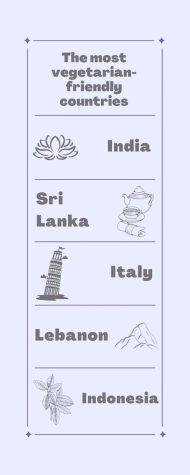
Throughout my 15 years as a vegetarian (not a vegan), I have come to understand that many people do not understand the difference between vegetarianism and veganism and thus are often confused by my practice. When practicing vegetarianism, one cannot eat meat of any kind including fish, but can eat any and all dairy products whereas vegans can’t eat meat, dairy products, eggs or any animal products. Many vegans also consider veganism to be a lifestyle rather than simply a diet, however, this feeling is generally not as strong among vegetarians.
I have been met with all sorts of reactions from people who learn about my diet. Some people are simply impressed and move on quickly. Sometimes people go on the defensive, explaining their choice to eat meat and I assure them that I am not judging their diet whatsoever. Often people are put-off, bombarding me with questions, “Why? How? Why? No way.” When I was younger I had other kids straight up tell me I was lying. As a kid that can be hard to deal with. Thankfully, I was supported by my mother who had similar experiences growing up.
Now, when someone starts interrogating me I simply ask, “Why do you care? I don’t care that you eat meat, not enough to ever interrogate you about your diet, ethical reasoning, etc. so why do you care so much that I do?” Vegetarianism is an alternative I have chosen and maybe you will too. However, I don’t judge you if you choose to eat meat. You have your own cultures and traditions. I believe that sort of judgment would be simply unproductive.
I am often asked if I am glad that my parents made an executive decision to raise me vegetarian until I was old enough to make the choice for myself. Simply, yes. In fact, I am very grateful my parents did this. As a result of their decision, I never had to “give up” meat to become vegetarian. I “don’t know what I’m missing,” as I am often told, which makes staying vegetarian a lot easier.
Now that I am old enough to choose for myself, I choose to remain vegetarian. This is for many reasons including ethics, environmental reasoning, and health.
The vast majority of meat produced and consumed in the U.S. and Western World at large is produced on what are called “factory farms”. These are giant farms intended to maximize production while limiting cost. Factory farms have incredibly inhumane conditions for not only animals produced but also employees working at them.
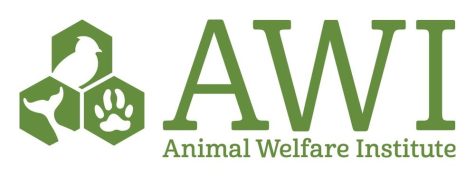
Dena Jones, the director of the Animal Welfare Institute, a group in Washington focused on reducing animal suffering, says, “Overall, we estimate that about 85% of farm animals are raised under intensive confinement conditions…There’s three things that we believe animals should have, and all three are compromised in these conditions. The three things are good health, emotional well-being and natural behavior or natural living.” according to The Future of Meat.
Employees at factory farms also face inhumane conditions. According to The Future of Meat, the per capita rate of workplace injuries and illnesses in U.S. meat processing is almost 40% higher than the average rate for all industries. A slaughterhouse worker loses a body part or sustains another serious injury every 48 hours in the U.S. Joshua Spect, an assistant professor of history at Notre Dame and author of Red Meat Republic: A Hoof-to-Table History of How Beef Changed America, says “Meat companies make profits by pushing workers to their limits.”
All of these factors have pushed more people to consider the ethics of eating meat.
Environmental factors have further driven discussions surrounding vegetarianism to the forefront. 14.5% of global planet-warming greenhouse gasses come from livestock. The industry also requires vast amounts of water and land. Large amounts of land have to be cleared for the industry, destroying natural habitats. The United Nations’ Intergovernmental Panel on Climate Change states that eating less meat is essential to ensuring an adequate food supply for a growing population and mitigation of climate change. According to The Future of Meat.
Another driving factor pushing many people to adopt vegetarian diets is that many experts believe that, if done properly, not eating meat will not harm and may even benefit your health. The American Dietetic Association (the largest body of diet and nutrition professionals in the U.S) has stated that a vegetarian diet is healthy, safe, and nutritionally adequate for all stages of life. This is also supported by the British Dietetic Association as well as the NHS. According to Vegetarians Live Longer Than Meat Eaters, the National Institutes of Health funded a study which showed that those who eat a vegetarian diet or only eat meat once a week are 12% less likely to die prematurely than their meat eating counterparts. The study also showed that vegetarians are 19% less likely to die from heart disease and are also less likely to die of diabetes or kidney failure. This study also concluded that vegetarians generally have longer life spans than meat eaters.
However, for me and much of my family the question of why to eat vegetarian is far simpler. Why kill animals for our consumption if it is not necessary? In our modern world this line of thinking has been modified as the average American is not directly killing the meat they consume and so the thought “the animals are going to be killed anyway as the meat industry is so huge and powerful” is often used to justify consuming meat. But, I simply ask why would you support a morally unjust production if it is unnecessary? It may seem as though you are just one person and can’t make a large difference, but big groups are made of individuals.
However, if you choose to adopt a vegetarian diet, it is important to do your research, possibly talk to your doctor, and make sure you still get all the nutrients necessary. Fortunately for me, my mom’s side of the family has incorporated protein rich ingredients into traditional Indian food naturally after thousands of years of being vegetarian. This makes vegetarianism a lot easier for me. However, the average American does not have this advantage and must be thoughtful about supplementing protein if they become vegetarian. Oftentimes, this means incorporating more eggs and legumes (quinoa, black beans, lentils, pinto beans, etc.) into one’s diet, and not just cutting the meat out.
For more discussion and information on the ethics surrounding vegetarian and veganism, I recommend the Ted Talk Every Argument Against Veganism.

Leela is a senior at Liberty High School. This is her second year on the Live Wire staff. At Liberty, Leela plays tennis and is part of SEA club. Outside...

Chloe is a senior at Liberty and this is her second year on staff. At Liberty, Chloe is involved in cheerleading and tennis. Outside of school, she enjoys...



